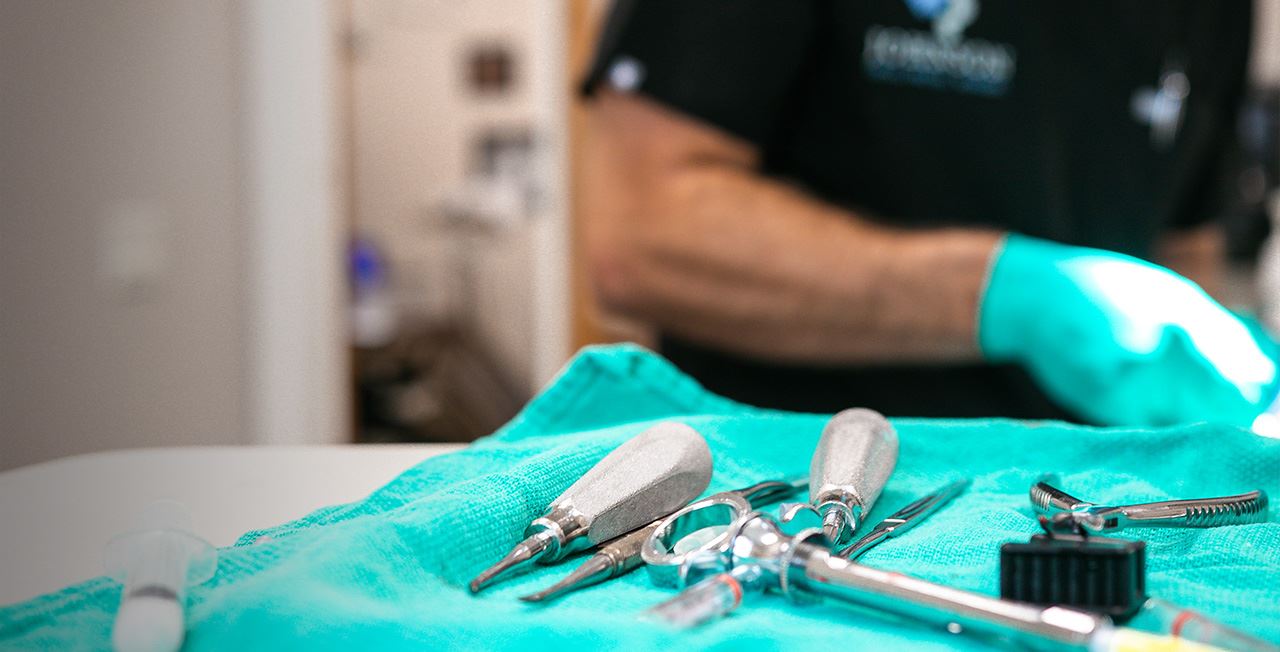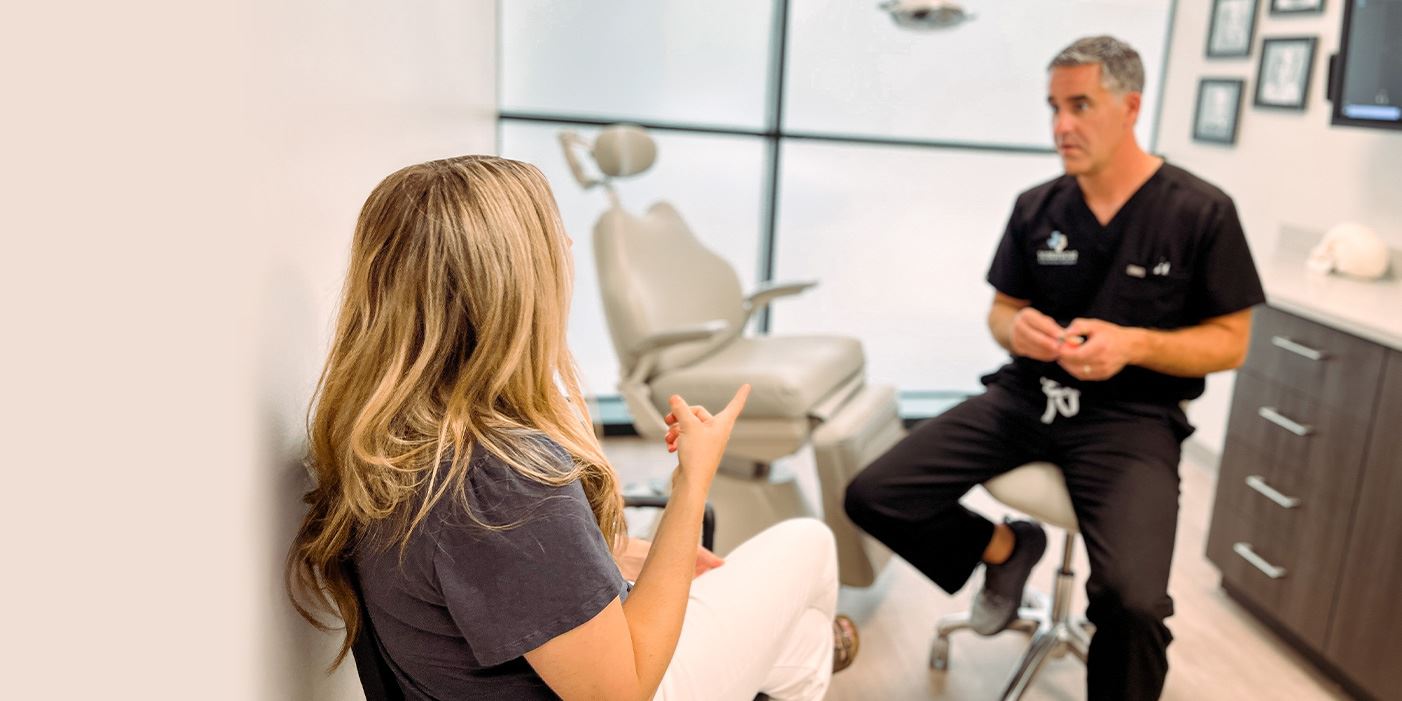

Bone Grafting in Dallas
Restorative Dental Work for Aesthetics, Reconstruction, or Dental Implant Placement in Dallas and the Park Cities Area
Are you missing teeth? Over time, this can cause your jawbone to atrophy and lose bone mass. As your jawbone deteriorates, this leaves unsuitable quality and quantity of bone for placing dental implants, not to mention it creates long-term shifting of remaining teeth and changes to your facial structure. Most patients in these instances cannot proceed with dental implants unless they undergo bone grafting. This exciting procedure gives us the ability to grow bone where it is needed to not only allow you to have implants placed, but to restore functionality and aesthetics to your smile.
How Does Dental Bone Grafting Work?
Depending on your needs, your bone graft material may come from various sources, such as another person (allogenic), an animal (xenogenic), another part of your own body (autogenous), or synthetic materials (bone morphogenic protein). During the bone grafting procedure, Dr. Johnson will place the material within the gum tissues of the empty socket, and over time, your natural bone structure will integrate with and grow into the bone graft material to restore the lost bone structure. You will come back to our practice for follow-up appointments to examine the progress of your jawbone healing and bone growth before you can proceed with dental implants.
The most common cause of bone loss in the jaws is tooth loss. That’s because once a tooth is extracted or lost, the bone that supported the tooth begins to atrophy, and the volume that was once there decreases. The body doesn’t want to utilize extra resources to maintain bone in an area without teeth, so it causes this atrophy, or resorption. This process begins immediately after the tooth is lost but can be delayed or reversed by bone grafting.
Reasons for Dental Bone Grafting
Dental bone grafting is a surgical procedure commonly used in dentistry to augment or regenerate bone in the jaw or other areas of the oral cavity. Here are three common reasons for dental bone grafting:
- Implant Placement: Dental bone grafting is often necessary when placing dental implants. Dental implants are titanium posts that are surgically placed into the jawbone to replace missing teeth. However, for successful implant placement, there needs to be sufficient bone volume and density in the jaw to provide a stable foundation for the implant. If there is inadequate bone due to bone loss from tooth extraction, gum disease, trauma, or other factors, a bone graft may be required to augment the jawbone and create a stable site for implant placement.
- Ridge Augmentation: Ridge augmentation is a type of bone grafting procedure used to restore the shape and size of the jaw ridge, which may have been lost due to tooth extraction or other reasons. After tooth extraction, the bone in the area of the extracted tooth may resorb or shrink, resulting in an uneven or inadequate jaw ridge. Ridge augmentation involves adding bone graft material to the deficient area to rebuild and reshape the jaw ridge, creating a more esthetically pleasing and functional foundation for dental restorations, such as dental bridges or dentures.
- Treatment of Periodontal Disease: Advanced periodontal disease, also known as gum disease, can result in bone loss around the teeth, leading to loose teeth and eventual tooth loss. In some cases, bone grafting may be required as part of the periodontal treatment plan to regenerate lost bone and restore the supporting structure around the teeth. This may involve bone grafting materials being placed in the affected areas to promote new bone growth and stabilize the teeth.
It's important to note that dental bone grafting is a complex procedure that requires careful evaluation and planning from our skilled Dallas oral surgery team. The specific type and extent of bone grafting needed will depend on the individual patient's oral health condition and treatment goals.
Understanding Bone Grafting Needs in Dallas and the Park Cities Area
Maintaining good oral health in Dallas and the Park Cities area comes with unique challenges. The fast-paced lifestyle and frequent consumption of sugary foods and drinks can contribute to gum disease and tooth loss, which often result in bone loss in the jaw. While local resources like the Dallas County Health and Human Services provide helpful oral health initiatives, many residents still need restorative procedures like bone grafting to address these issues.
This is especially true in neighborhoods such as Highland Park and University Park, where a confident smile and aesthetics play an important role. Bone loss can impact more than just dental function, it can also affect your overall appearance. Fortunately, bone grafting offers an effective solution. It helps rebuild the bone structure needed for procedures like dental implants, allowing you to restore both functionality and confidence in your smile.
Adding to these challenges, the dry climate in Dallas can worsen gum issues, increasing the risk of periodontal disease, a leading cause of bone loss. Recognizing these local factors is essential in tailoring care to the community’s specific dental health needs. Our team fully understands these unique concerns and is dedicated to providing personalized treatments designed for you.
If you’re worried about jawbone health or potential tooth loss, consulting with an experienced dental professional is crucial. A thorough understanding of local conditions ensures you’ll receive the most effective care. Don’t wait to prioritize your oral health — contact us today to learn how bone grafting can help you achieve a healthier, more confident smile right here in Dallas.
Frequently Asked Questions About Dental Bone Grafting in Dallas
How long does dental bone grafting take?
The duration of the procedure can vary, but it typically takes between 1 and 3 hours.
How long does it take to recover from dental bone grafting?
Recovery time varies depending on the extent of the procedure and individual factors. You may experience some discomfort and swelling for the first few days, but most patients can return to their normal activities within a week or two.
Can I eat immediately after dental bone grafting?
You will likely be instructed to follow a soft diet for the first few days after surgery to allow your mouth to heal. Avoid hard, crunchy, or chewy foods.
Will the grafted bone look natural?
The grafted bone will eventually become indistinguishable from your natural jawbone.
Will I need stitches after dental bone grafting?
Yes, stitches are often used to close the incision. They may be self-dissolving or require removal by your oral surgeon.
A thorough evaluation and consultation with our oral surgeon will help determine if dental bone grafting is necessary and appropriate for your dental needs. Contact us online today to schedule an appointment with Johnson Oral Facial Surgery.


Ready to Receive the Care You Deserve
Book Your Consultation!Contact Johnson Oral Facial Surgery for Bone Grafting in Dallas
Are you interested in learning more about restoring the functionality of your teeth, gums, and mouth? We may be able to guide you to something that would improve your quality of life, not to mention the aesthetics of your face, such as bone grafting.
If you are interested in learning more about bone grafting in Dallas at Johnson Oral Facial Surgery, please contact us today at (214) 206-4646.

-
“Dr. Johnson and his staff were extremely comforting and professional. He took great care throughout the procedure, and his assistants were amazing. I could not recommend him more.”

-
When You Become Our Patient, You Become Our Family
-
15 Years Experience, Over 15,000 Patients Treated
-
Our Office is Conveniently Located in the Heart of Dallas
-
We Prioritize Safety and Exceptional Patient Care






